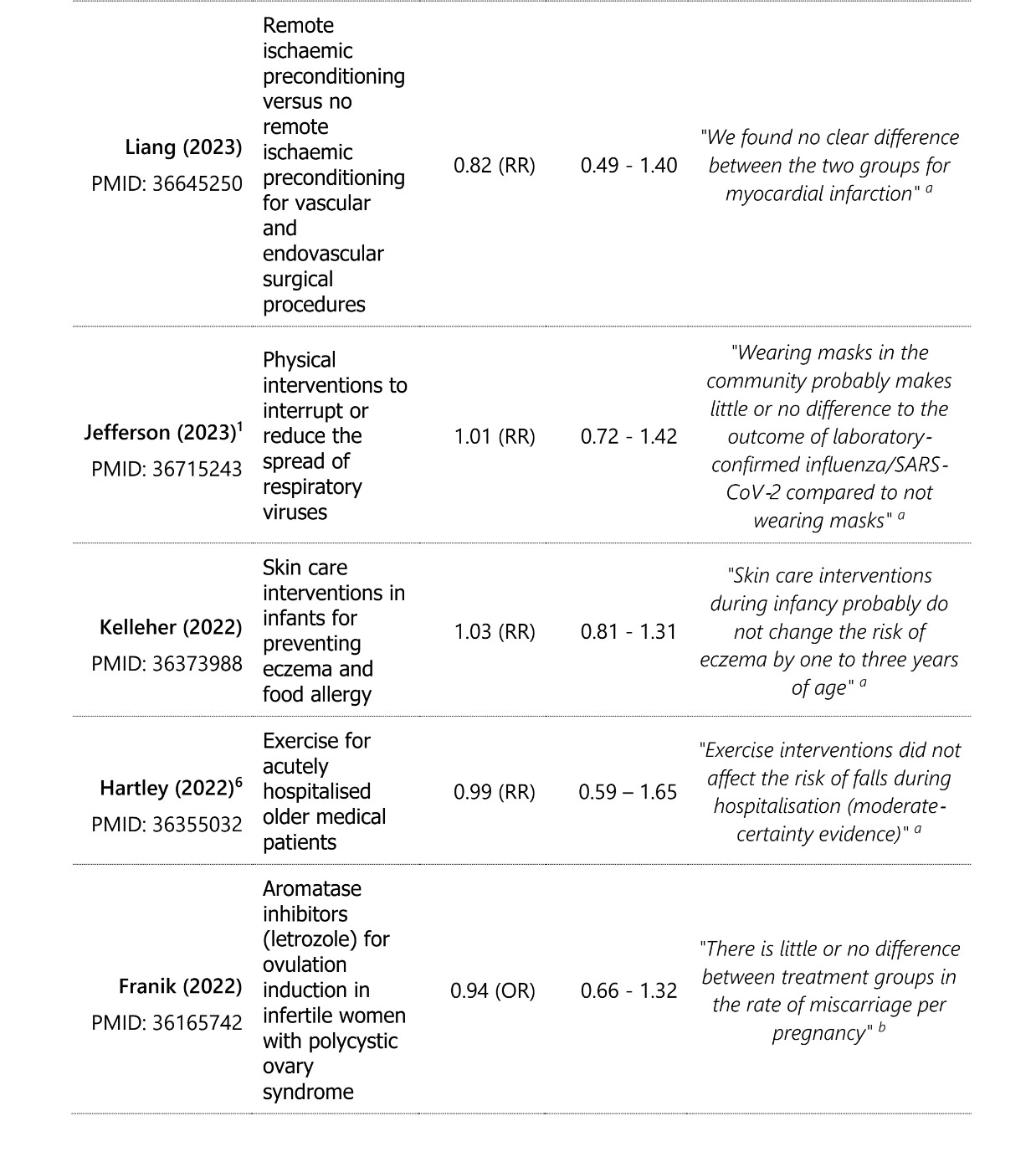How does Cochrane normally handle wide confidence intervals?
Editor and chief Soares disgracefully caved to pressure
Our new pre-print is out, let me walk you through it.
When I read the review by Jefferson and colleagues on physical interventions to prevent the spread of respiratory viruses, and I saw that pooled randomized trials failed to show masks slowed the spread. My conclusion was simple: there is no evidence masks work.
That's the exact same conclusion that Tom Jefferson reached, and he said as much in an interview.
Why did Jefferson and I agree? Because the standard in medicine is if you run many randomized studies and you get a null result, your practice doesn't work. That's how it's always been.
The Cochrane editor-in-chief, and many internet pundits, did not agree. They said the evidence was compatible with benefit. Why? Because the confidence interval is wide.
The question then becomes: do they say that every other time this has happened? Are they consistent?
We sought to investigate.
We pulled the last 20 Cochrane reviews that all have similar results, and I'm going to show you a plot of all of them here.
As you can clearly see: The Jefferson review (*) is one of many. It falls in line with the rest of them.
So what sort of language do the rest of the reviews use? Here are some quotes:
And you can read more in the pre-print.
What's the point?
What am I to think if the only time you say the wide confidence interval means it's inconclusive is for the one thing that you have a religious devotion to? You literally never say it elsewhere. It speaks so poorly of you to be inconsistent.
The editor-in-chief of Cochrane disgraced herself by caving into pressure from mask zealots. She is not a consistent actor.
Ultimately, masking was as simple empirical question that could have been settled with even more randomized trials, which would tighten up that confidence interval… probably around null, nobody wanted to run those studies.
Now, they invent a new way to talk about negative results. Pathetic.






I was recently at a family wedding with some relativrs ( smart and lovely people ) who were 75 years plus who told me they were shocked that no one wore masks on the airline like they did on their cross country flights. They told me how careful they always are when they travel. I then asked them “then why don’t you have a mask on right now at this cocktail reception?“
This is cognitive dissonance…,
Cross-posting my comment from another blog as it seems apropos.
Can courage, judgement and critical thinking triumph over fear and social contagion? That is on my mind today.
I’m a physician and department chair at a large academic medical center. Today, while on call in the hospital, I’m sitting here looking at a sizable minority of my colleagues and trainees still going about their duties fully masked…and I’m bewildered! We are now 4 weeks out from California’s “careful and thoughtful analysis” of pandemic trends, yielding an end to THE STATE OF EMERGENCY, and allowing hospitals to rescind their mask mandates. After reams of data capped off by the recent Cochrane Review showed the utter failure of masks, I felt certain we would all happily discard our face diapers to the dustbin, saving them only for the woodshop or the occasional trip to the attic. Yet here I sit, looking around at these young physicians (and yes, age and eagerness to mask is inversely proportional), apparently America’s best and brightest, still dutifully affixing this totem to their faces. These are supposed to be scientists…formidable thinkers! I swear these people started smart, and we broke them. We took excellent raw material, and we wasted it. My questions to them:
1. Are your actions informed by facts?
2. Are your beliefs falsifiable?
If both can’t be answered yes, you are not hirable by me (and I am in a position to hire physicians).
I wrote this text to one of my partners.
“Ya know…
People who persist in masking, after the pandemic is over, after the stupid state rules have finally been revoked, after multiple publications have shown that they do and did nothing …
I consider it a very good indicator of a lack of critical thinking skills, poor judgment, irrational risk aversion, and at best, cowardice to stand for the truth.
I would not want to hire anyone in that group. As far as I’m concerned, they probably don’t belong in a field of science. I no longer trust them to make rational decisions, and rational decisions are the underpinnings of everything we do”.
Is this too harsh?
So my question - how can we change this? How can we escape this death spiral? I read my Prasad, my eugyppius, my el gato malo, Taibbi, Sasha, Free Press, VDH, and others. All excellent in chronicling the spiral and pointing out hypocrisy, but light on specific ways to regain our footing. Are these thought patterns baked into much of the population, especially the younger generations? I remain cynical about reversal. Is now the time to panic?